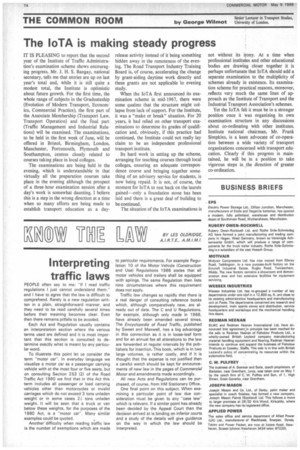The loTA is making steady progress
Page 76

If you've noticed an error in this article please click here to report it so we can fix it.
TT IS PLEASING to report that the second year of the Institute of Traffic Administration's examination scheme shows encouraging progress. Mr. J. H. S. Bangay, national secretary, tells me that entries are up on last year's total and, while it is still quite a modest total, the Institute is optimistic about future growth. For the first time, the whole range of subjects in the Graduateship (Evolution of Modern Transport, Econom: ics, Commercial Practice), the first part of the Associate Membership (Transport Law, Transport Operation) and the final part (Traffic Management and Industrial Relations) will be examined. The examinations, to be held in the first week of June, will be offered in Bristol, Birmingham, London, Manchester, Portsmouth, Plymouth and Southampton, centres closely related to courses taking place in local colleges.
The examinations are being held in the evening, which is understandable in that virtually all the preparation courses take place in the evening although the prospect of a three-hour examination session after a day's work is somewhat daunting. I believe this is a step in the wrong direction at a time when so many efforts are being made to establish transport education as a day release activity instead of it being something hidden away in the remoteness of the evening. The Road Transport Industry Training Board is, of course, accelerating the change by grant-aiding daytime work directly and these grants are not applicable 'to evening study.
When the ',DTA first announced its examination scheme in mid-1967, there were some qualms that the structure might collapse from lack of support. For the Institute, it was a "make or break" situation. For 20 years, it had relied on other transport examinations to determine its grades of qualification and, obviously, if this practice had continued, the Institute could not really lay claim to be an independent professional transport institute.
Its hard work in setting up the scheme, arranging for teaching courses through local colleges, ensuring an adequate correspondence course and bringing together something of an advisory service for students, is now being repaid. It is not, of course, the moment for loTA to rest back on the laurels gained—only a foundation stone has been laid and there is a great deal of building to be continued.
The situation of the loTA examinations is not without its irony. At a time when professional institutes and other educational bodies are drawing closer together it is perhaps unfortunate that ToTA should add a separate examination to the multiplicity of schemes already in existence. Its examination scheme for practical reasons, moreover, reflects very much the same lines of approach as the Institute of Transport and the Industrial Transport Association's schemes.
Yet the IoTA felt it must be in a stronger position once it was organizing its own examination structure in any discussions about co-ordinating with other institutes. Institute national chairman, Mr. Frank Simpkins, is a keen advocate of co-operation between a wide variety of transport organizations concerned with transport education. Clearly if this progress is maintained, he will be in a position to take vigorous steps in the direction of greater co-ordination,


















































































































